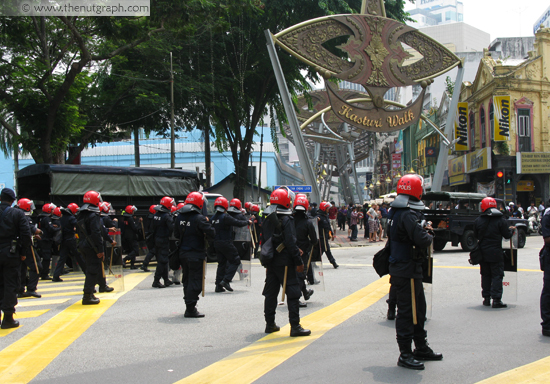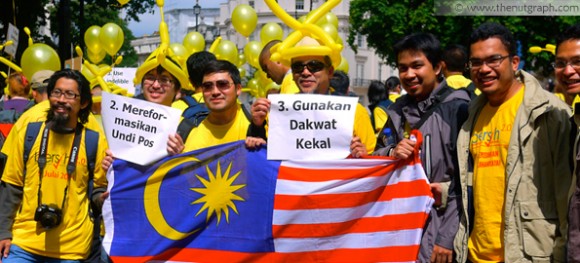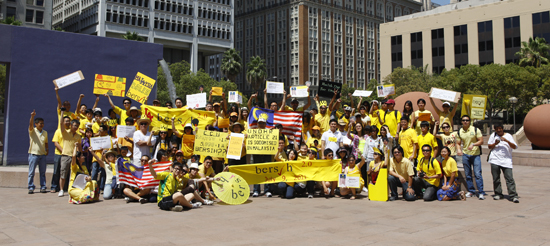PRIOR to 25 June 2011, all seemed to be going relatively well for Prime Minister Datuk Seri Najib Razak’s administration. The Barisan Nasional (BN) government was hard at work improving public perception, with extensive media coverage on government programmes such as the Government Transformation Programme and Economic Transformation Programme. There were talks of a possible early general election, not due until 2013.
But on 25 June 2011, 31 Parti Sosialis Malaysia (PSM) members were arrested, purportedly on their way to a Bersih 2.0 roadshow. Over the next two weeks, Malaysians saw a massive crackdown on alleged Bersih supporters, with over 200 arrested in the run-up to the 9 July march. Over 1,600 were arrested on the day of the march itself. Has the Bersih rally and the government’s response changed the political landscape in any way? And what’s next for Bersih’s campaign for a freer and fairer electoral process?

The Nut Graph speaks to political scientist and Bersih 2.0 steering committee member Wong Chin Huat.
TNG: Would the recent sustained crackdown on Bersih 2.0 supporters and the arrests under the Emergency (Public Order and Prevention of Crime) Ordinance have changed the BN government’s momentum in any way?
Yes. Bersih 2.0 is surely a game changer in electoral politics, and very much of the BN’s own doing. By drumming up fear and counting on the spectre of 13 May 1969 to deter people from going to the street, it has helped in fact to bury it for good.
Malaysians saw with their own eyes that we were the same before water cannons, tear gas and police batons. We were united in our suffering and in the face of police brutality. We helped each other climb over walls. We passed water and salt around. There are simply countless eyewitness accounts that speak movingly of how we felt so Malaysian on that day. I couldn’t help crying several times watching the video clips, looking at the pictures and reading the stories about the march.
It’s a defining moment for this country. More so than the 2007 Bersih rally, which was undeniably dominated by PAS supporters. More than the Reformasi protests in 1998, as they failed to rope in those who did not sympathise with (Datuk Seri) Anwar Ibrahim. And I believe it may be even greater than 31 Aug 1957 and 16 Sept 1963 for we only had the state of Malaya and Malaysia built then, but not a people of Malayans and Malaysians. We have so many misgivings of each other even after Independence of 54 and 48 years; but on 9 July, we were all brothers and sisters. We are the “Yellow Generation”, the Bersih alumni, the Bersih family.
The BN lied about the events on the ground after the 9 July march. Do you expect those who braced water cannons and tear gas to vote for the BN in a generation’s time?

Why do you think the BN government would risk damaging public perception towards it by adopting such a heavy-handed approach towards Bersih 2.0? What was it trying to achieve?
[The BN is] very Hobbesian, believing that Malaysians will fear violence more than anything and will tolerate an authoritarian government. Look at the “McCarthyism“-like campaign launched by the Home Ministry and the police by alleging Parti Sosialis Malaysia activists of “waging war against the King”. This was for simply possessing t-shirts [displaying] former Communist figures. They also demonised the Bersih secretariat for having a poster of Shamsiah Fakieh.
These tactics are reminiscent of the Cold War era. Perhaps the BN government thought that by evoking the communist threat, they could rally Malay Malaysians. Or by allowing (Datuk) Ibrahim Ali to make insinuations about an ethnic riot, they could scare Chinese Malaysians to stay at home. Or by demonising (Datuk) Ambiga Sreenevasan as a possible threat to Islam, they could deter some cautious Indian Malaysians to stay out of Bersih. They might have got it right if this was the 1970s or even 80s. But [if that is the case], they forgot to change their calendars in their heads. It’s now 2011.
How was the Bersih 2.0 march different from the 2007 march in terms of the level and types of support, as well as the opposition towards it?
Due to the heavy blockade and arrests, the turnout in 2011 was not much bigger than the 2007 one, estimated somewhere around 50,000 to 60,000. However, it was magnificent in two ways.
First, it was really diverse. Thousands of Chinese Malaysians joined the crowd and made up about one-third of the crowd in many places. It is puzzling how esteemed Universiti Sains Malaysia political scientist Dr Sivamurugan Pandian, who said he observed the march, failed to see many Chinese Malaysians. He must have been observing the march in Masjid Negara or from behind Umno Youth chief Khairy Jamaluddin’s Patriot group.

There were also people from different age groups. Not only the young were excited, the elderly like Pak Samad (National Laureate Datuk A Samad Said) and Auntie Bersih were in the forefront fighting for a better Malaysia. Everyone took ownership of this country.
Secondly, it was truly a bottom-up effort and dominated by grassroots people, not the politicians or even the Bersih 2.0 leaders. Every Bersih alumnus has their own story to tell.
Personally, I think it is extremely stupid of the BN to try to demonise the brave Malaysians of 9 July as opposition supporters. They are the majority, including many nonpartisans. If you insist that they are all opposition supporters, you are conceding the next election to the opposition.
Pakatan Rakyat (PR) politicians were among the leaders in the march and were among those arrested by the police. Does this lend credence to the BN government’s accusation that the march was opposition-initiated? Can the march still be considered a civil society movement?
As Ambiga aptly put it, opposition leaders and supporters are Malaysians, too. They have every right to demand a clean and fair electoral system and process so that they have the fair chance to win and lose in a dignified manner. What’s wrong with that? If the BN insists on using dirty tactics – now insinuating that Bersih rally participants were paid – then they have no right to question those who yearn to be clean.
We should instead ask, why were there no BN leaders arrested for championing electoral reform? Bersih 2.0 is certainly a civil society movement because we will demand from a PR government the same changes we are asking for now.
Now that the march is over, how will Bersih 2.0 be proceeding to achieve its eight demands for a fairer and cleaner electoral process? With the BN government still intent to portray Bersih as an illegal organisation, will this hamper the negotiation and advocacy process?
Bersih will be organising roadshows on the electoral process. We will also be systematically collecting more evidence of electoral fraud. This will hopefully make the Election Commission and the government face up to public opinion.

The witch hunt? The government can continue its overdrive of arresting those wearing yellow or cleaning up the streets or preventing “yellow dinners”. (Datuk Seri) Hishamuddin Hussein can continue living out his projection of himself as Senator McCarthy, who drummed up anti-Communist sentiment in the US while producing little evidence. Hishammuddin can arrest us if he wants. He just has to make sure that there are enough lockups to host millions of people who want a genuine democracy.
Najib and Hishammuddin can continue to sing the tune of illegality. I have only one reminder for them: In 1982, the Polish Communist government banned the popular democratic movement Solidarity Union. But where are the Polish Communists now? ![]()
Wong Chin Huat is a Bersih 2.0 steering committee member. He is also a political scientist by training and a journalism lecturer by trade. If readers have questions and issues they would like Wong to respond to, they are welcome to e-mail editor@thenutgraph.com for our consideration.
Read previous Uncommon Sense columns


m.k. says
Excellent interview. We have eaten too much of the same pudding for nearly 54 years. We need a change. Malaysia is slowly but surely heading for a CHANGE at GE13. Let us make it happen. God save Malaysia..
HM says
3. Use of indelible indelible ink must be used in all elections. It is a simple, affordable and effective solution in preventing voter fraud. In 2007, the EC decided to implement the use of indelible ink. However, in the final days leading up to the 12th General Elections, the EC decided to withdraw the use of indelible ink citing legal reasons and rumours of sabotage.
Bersih 2.0 demands for indelible ink to be used for all the upcoming elections. Failure to do so will lead to the inevitable conclusion that there is an intention to allow voter fraud.
RESPONSE:
Fewer than 20 countries out of 194 countries use inedible ink in their elections. Indelible ink is NOT used by developed countries such as the United States, United Kingdom, Hong Kong, Singapore, France, Japan and many others. It is used mainly in less developed countries with large populations.
Some of the countries include Afghanistan, Benin, Burkina Faso, Democratic Republic of the Congo, Egypt, Gambia, India, Indonesia, Iraq, Lebanon, Mauritania, Peru, Philippines, South Africa, Sri Lanka, Suriname, Tchad, Uganda, and Zimbabwe.
It is also worth to note that indelible ink is not a fool-proof method and has its disadvantages such as:
· Indelible ink itself can be used to commit electoral fraud by marking opponent party members before they have the chance to cast their votes; and
· There have been cases in Afghanistan where “indelible” ink have washed off voters’ fingers using bleach; such ink was blamed for contributing to fraud in the first Afghan presidential election in 2005.
In short, if Malaysia decides to use indelible ink, for a country that has a comprehensive database and biometric identification of its citizens, it can be viewed as step backwards for the nation and not a step forward.
For those countries who don’t use inedible ink, do you regard them as corrupt?
JW Tan says
Indelible ink is used where the electoral roll cannot be trusted, and where one’s identity can be easily forged. Even more important than the facts is the perception that electoral fraud exists.
We might have a comprehensive database and biometric identification, but there is still the nagging suspicion that voter records are somehow tampered with. In that sense, we have more in common with Afghanistan, Benin, Burkina Faso, DR Congo, Egypt, Gambia, India, Indonesia, Iraq, Lebanon, Mauritania, Peru, Philippines, South Africa, Sri Lanka, Suriname, Chad, Uganda, and Zimbabwe.
We certainly do not have much in common with the United States, United Kingdom, France or Japan. All these countries have true democracies, i.e. they have at least 2 peaceful transitions of government between opposing parties, and people believe, at least, that elections are fair, in part because they mostly are.
Singapore and Hong Kong are even less democratic than Malaysia. Aiming to be like them is a true step backward.
HM says
Are you suggesting that Singapore and Hong Kong voters should go out in the streets and protest for indelible ink too? You think the US election process was good? Bush practically stole the election.
http://harpers.org/archive/2008/03/0081943
Do you think the UK voting process is also perfect? Why did they have a referendum on alternative voting?
How much trust do you need? The fact that the opposition can win more seats WITHOUT indelible ink shows that it is trustworthy.
Also, indelible ink can be faked. Someone could do a switch at the polling station or before it reaches there. Someone could coat his fingers before dipping in ink, then use the coating to remove the ink. Old or gullible people could be tricked into dipping their fingers before actual voting begins.
There are many other controversies: http://en.wikipedia.org/wiki/Election_ink#Controversies
This whole issue of the ink is a canard and deception by the opposition and their backers to make the WHOLE process seem bad. It’s throwing-the-baby-with-the-bathwater approach. It’s used political to discredit the government and other institutions to install an alternative.
“It has been said that democracy is the worst form of government except all the others that have been tried.” — Sir Winston Churchill
JW Tan says
No, I’m saying that you are simply comparing one characteristic across several different electoral systems, because you believe that by adopting certain processes in common with real democracies, it magically makes us more democratic. This is false.
There is a perception that there is voter fraud. The government ought to swallow it’s pride and allow the use of indelible ink to erase that perception. It’s the perception that stains our democratic credentials, not the facts.
With regards to Singapore and Hong Kong, they are de facto dictatorships. What they do have in common is a reasonably transparent and credible process of updating and maintaining the electoral roll. With regards to the US, they at least have a credibly independent judiciary, and a history of not interfering with the electoral roll. With regards to the UK, the main reason why alternative vote was deemed to be possible is because everyone believes that is no (or negligible) incidence of rigging the ballot boxes.
We are not a real democracy. We’ll be one when we have at least 2 peaceful transitions of power between opposing parties. This is the ONLY foolproof measure of whether or not democracy is working. The opposition can win seats – until it achieves power, and more importantly, gives up power in due time, we cannot say that democracy is working.
JW Tan says
It’s also worth noting that the addition of indelible ink to the arsenal of checks would serve only to strengthen the process. When you go to vote, your IC is checked against your details on the voter roll, and your name is noted as someone who has come to vote. Adding indelible ink to the process prevents (or makes it difficult for) you from voting again as someone else with a forged IC, i.e. a crude form of ballot box stuffing.
As a measure the indelible ink process is not perfect. But at the very least it makes it more difficult to fool the process with impunity. That’s the reason for the demand – there is no panacea, only incremental steps for improvement.
pilocarpine says
As much as we fancy all the noise and great theatrics associated with the march, why can’t the protest be more peaceful – yet even more [consequential] like Hartal in 1947 – if the support for the cleaner electorate system is from the majority of the rakyat?
JW Tan says
A hartal only works when you happen to be employed by the government. If you work in the private sector, going on strike is fairly pointless.
And hartals aren’t necessarily peaceful. Lots of hartals, especially on the Indian subcontinent, have been accompanied with sabotage, vandalism, and yes, even marches.